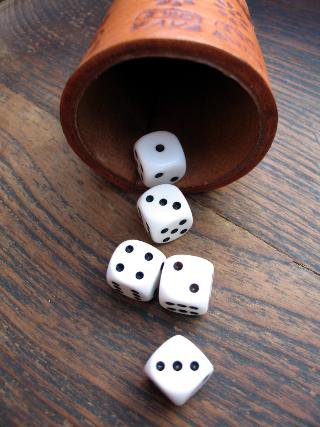A Pepper Grinder Post
Two Story World
I am reading a really good book right now. It is Total Truth by Nancy Pearcey. One of her main points is that much of the modern world tends to have a two story view of reality. In this view, the first story contains things that are objectively true; the second story, things that are subjective.
The fact that a rock, dropped on earth, will fall to the ground is on the first story. We can confirm through scientific experiment that gravity will do what it does. On the other hand, a belief in the healing power of crystals is relegated to the second story. You can believe it, if you want to, and it may make you feel good to believe it, but you probably can’t prove it scientifically.
So far, that doesn’t sound so bad. I think most of us are comfortable making a distinction between facts and opinions. The problem comes in how the rules are made about what is a fact and what is an opinion.
‘Scientific fact’ has become a code phrase for things that are arrived at by starting with a naturalistic presupposition. By naturalistic, I mean a presupposition that everything that has happened, is happening, and will happen, is the result of natural processes acting with no guiding force. Can anyone prove that presupposition? Of course not. A presupposition is something you cannot prove. You take it on faith and then try to build logically upon it.
 The problem is that this starting point is so widespread, many people don’t even think to question it. The idea that something with the complexity of the simplest cell could have appeared through chance occurrences is about as believable as the idea that if you left enough junkyards sitting for long enough, one of them would spontaneously produce the Hubble telescope. And yet, the belief that all life evolved from simple atoms by the process of pure chance is ‘SCIENCE.’ It is right there, sitting in the recliner, on the first floor.
The problem is that this starting point is so widespread, many people don’t even think to question it. The idea that something with the complexity of the simplest cell could have appeared through chance occurrences is about as believable as the idea that if you left enough junkyards sitting for long enough, one of them would spontaneously produce the Hubble telescope. And yet, the belief that all life evolved from simple atoms by the process of pure chance is ‘SCIENCE.’ It is right there, sitting in the recliner, on the first floor.
On the other hand, the belief that an intelligent being created the things which are so complex we can’t even understand them yet (to say nothing of being able to duplicate them)—that is ‘RELIGION.’ It is shivering in that drafty bedroom on the second floor. (If you have any doubts about that, look at the hysterical reactions to any attempts to present Intelligent Design in schools along with Darwinian evolution, or even to point out difficulties with Darwin’s theory.)
The saddest thing about this whole situation is how many Christians accept it as natural. Instead of seeing our beliefs, and the Lord God, as relevant and central to every single aspect of life, we take the crust we have been thrown. And what is that crust? We are allowed to hold our beliefs as “true,” as long as we don’t try to “force them” on others or apply them to the areas that “belong” to science. For example, it is fine if we don’t want to marry someone of the same sex, but if we politely decline a job offer to take photos of a same-sex union, watch out! It is all right to be personally opposed to abortion, but if you don’t want the health insurance your company provides its employees to cover the morning-after pill, get ready for a fight. When you start to allow your faith to influence how you do your job, how you want your children taught, and your political views, you have crossed the line into enemy territory.
The truth is, the ogre of science and naturalism which has taken over the first floor of the house and driven us upstairs is every bit as much of a religion as ours. The difference is that a huge part of our society has come to accept that it is what it claims to be—scientific truth—instead of what it really is, a belief system based on unprovable assumptions.
This is a war, and if we accept our second story position, we will have laid down our weapons for a promise of a nice, comfortable POW camp. What is worse, the weapons we will have laid down are far more powerful than anything possessed by the enemy.
We must remind ourselves that we serve the God who created this incredibly complex universe out of nothing. This belief has far better proofs than the theories trying desperately to show how everything could have happened by chance. Immerse yourself in things that build up your confidence in the Truth (with a capital T), rather than those that relegate Christian belief to a truth (with a small t). Pearcey’s book is a great starting point (a little dry in spots, but very good), and she recommends and references many other excellent works. Most of all, read the Bible. In our loosey-goosey world, the Bible is the rock we can stand on. Apply its truth to EVERY area of your life. You won’t be bored, and you won’t be stuck on the second floor.
- Pepper
Posted 2014-03-14
Photo credits: dice by sanja gjenero
